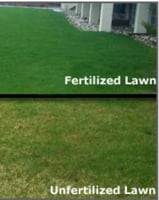Discover the amazing benefits of loamy soil for your lawn and how it can transform your landscaping...
Benefits to Scalping Bermuda and Zoysia Lawns
Why scalping Bermuda and Zoysia grasses is important for lawn health
Understanding the Benefits of Scalping

Scalping Bermuda and Zoysia lawns can offer several benefits for their health and appearance. By understanding the benefits of scalping, you can make informed decisions about how to care for your lawn.
One benefit of scalping is that it helps remove the old, dead grass and thatch build-up. Thatch is a layer of dead grass, roots, and debris that accumulates at the base of the grass blades. If left unaddressed, thatch can prevent water, air, and nutrients from reaching the roots of the grass, leading to poor lawn health. Scalping removes this thatch layer, allowing for better nutrient absorption and overall lawn health.
Another benefit of scalping is that it encourages new growth. When you scalp your Bermuda or Zoysia lawn, you are essentially cutting the grass very short, which stimulates the grass to produce new shoots and fill in any bare spots. This can result in a thicker, healthier lawn with improved density.
Additionally, scalping can help control the growth of weeds in your lawn. By cutting the grass very short, you reduce the chances of weed seeds germinating and establishing themselves in the lawn. This can help keep your lawn weed-free and looking its best.
Overall, understanding the benefits of scalping Bermuda and Zoysia lawns can help you maintain a healthy and beautiful lawn.
Take it to the dirt
When scalping Bermuda and Zoysia lawns, it's important to take it all the way down to the dirt. This means cutting the grass extremely short, almost to the soil level. By removing most of the grass blades, you ensure that the thatch layer and any old, dead grass are completely cleared away.
Taking the lawn down to the dirt also helps promote new growth. When the grass is cut very short, it stimulates the grass to produce new shoots and fill in any bare spots. This can result in a thicker, healthier lawn.
However, it's important to note that scalping should only be done once or twice a year, during the spring and summer seasons. Scalping too frequently can weaken the grass and make it more susceptible to damage and disease.
By taking it to the dirt during scalping, you can effectively remove the thatch layer, encourage new growth, and maintain a healthy Bermuda or Zoysia lawn.
Keep the lawn short for best appearance
Scalping Bermuda and Zoysia lawns can help you achieve the best appearance for your lawn. By keeping the lawn short, you can create a clean and uniform look that enhances the overall aesthetics of your outdoor space.
A short lawn also has other practical benefits. It can make mowing and maintenance easier, as there is less grass to cut and trim. Additionally, a short lawn can help prevent pests and rodents from taking refuge in tall grasses.
To maintain the best appearance, maintain half an inch to two tops for Bermuda or Zoysia lawn. This will ensure that the grass remains short and neat, providing a visually appealing landscape.
However, it's important to strike a balance and avoid cutting the grass too short, as this can damage the grass and make it more vulnerable to stress and disease. Consult with a lawn care professional or refer to specific guidelines for your grass type to determine the ideal height for scalping.
When to scalp? (Spring and summer)
Scalping Bermuda and Zoysia lawns should be done during the spring and summer seasons. These are the periods when the grass is actively growing and can recover quickly from the scalping process.
Spring is an ideal time to scalp your lawn as it marks the start of the growing season. By scalping in the spring, you can remove any dead grass and thatch buildup from the winter months, allowing for new growth and a fresh start for your lawn.
During the summer, scalping can help keep your Bermuda looking its best. By cutting the grass short, you can create a well-manicured appearance and reduce the chances of weed growth. Additionally, scalping in the summer can help the grass withstand heat stress and improve its overall health.
It's important to note that scalping should be done when the grass is dry to avoid tearing or damaging the grass blades. Additionally, make sure to follow proper scalping techniques and guidelines to minimize any potential harm to your lawn.
Prepare for a ton of debris.
Scalping Bermuda and Zoysia lawns can result in a significant amount of debris that needs to be managed. When you scalp your lawn, you are essentially removing a large amount of dead grass and thatch, which can accumulate and become quite heavy.
To prepare for this debris weight, it's important to have a plan in place. Consider using a bagging attachment on your lawn mower to collect the debris as you scalp. This will make it easier to dispose of the grass clippings and thatch.
Alternatively, you can also use a rake or a leaf blower to gather the debris after scalping. Make sure to collect and dispose of the debris properly to prevent it from smothering the grass or causing any other issues in your lawn.
By preparing for the debris ahead of time, you can ensure a smooth and successful scalping process for your Bermuda or Zoysia lawn.
Even when the weather is cooling down, the grass can remain green longer when maintained this way.
![3K4E4wE[1]](https://cleanyard.care/hs-fs/hubfs/3K4E4wE%5B1%5D.jpg?width=1122&height=756&name=3K4E4wE%5B1%5D.jpg)

